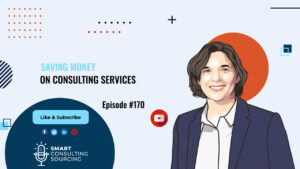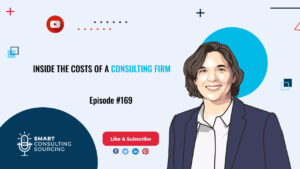Welcome back, fellow procurement enthusiasts, to another thrilling episode of Smart Consulting Sourcing, your go-to podcast for all things consulting procurement. My name is Helene and I am your host today. We’re now entering the home stretch of our journey on how to master the art of “Buying consulting services like a pro.” And today, we’re about to tackle a topic that requires finesse and strategic decision-making—the process of terminating a project on time or even earlier than expected.
Now, termination might not be the most glamorous aspect of project management, but it’s a reality that every procurement leader needs to be prepared for. Whether you’re facing unforeseen circumstances or strategic shifts within your organization, knowing how to navigate this challenging terrain is crucial.
In this episode, we’ll be exploring the ins and outs of terminating a project, from making scope adaptations to managing the termination process itself. We’ll dive into the intricacies of handling payments, ensuring a seamless final wrap-up, and conducting a comprehensive performance debriefing. By the end of this episode, you’ll be equipped with the knowledge and strategies to handle project terminations with confidence and professionalism.
Before we dissect the intricacies of project termination, let’s hit the rewind button to refresh the invaluable insights we shared in our previous episode. Last week, we explored the vital issue of gearing up for transition when consultants are prepared to take their leave.
To brace for this departure, you need a well-crafted plan encompassing knowledge transfer and ongoing support. Gain clarity on what’s to follow and how to distribute resources. When considering and choosing recommendations, ensure clear communication, and give direction on implementation and potential failure management.
To sustain the knowledge and skills you’ve developed, consider setting up refresher courses, fostering mentorship connections, and tapping into consultants for continued support. Moreover, remain in contact with your consultant to foster ongoing collaboration and unearth fresh ideas that could give you a competitive advantage, even post-project completion.
Take note of the consulting team’s performance throughout the project—from the bidding phase to crucial tasks, deadlines, and project closure. This record will be a valuable asset when wrapping up the project or addressing any issues.
Organize regular meetings to assess progress, make required adjustments, and improve your initial investment. Holding these meetings prevents complacency and ensures continued success.
Remember, the endgame extends beyond merely wrapping up the project. It’s about generating sustainable value that enhances your competitive standing. By sticking to these guiding principles, you can steer your organization toward perpetual success and fully capitalize on your consulting partnerships.
If you happened to miss our last episode, worry not—you can catch up on most streaming platforms, including Spotify, Apple Podcast, and YouTube. For those seeking more comprehensive insights, visit our website, consultingquest.com. There, you’ll discover our detailed white papers, enlightening ebooks, and complete transcripts of all our podcast episodes.
And while you’re there, don’t forget to share the podcast with your team and leave us a review. Your feedback is not just appreciated—it’s essential. It fuels our commitment to delivering ever more enriching content for your benefit. So, share the wisdom, spread the word, and let’s continue this journey of knowledge together.
Termination of Consulting Projects: Finding the Sweet Spot in Unpredictable Scenarios
Alright, let’s pivot back to the star of today’s show—how to pull the plug on a consulting project the right way. Most times, a project is considered ‘finished’ when the consulting firm has dotted the I’s and crossed the T’s on all the agreed-upon deliverables, either in the original contract or any added amendments, and has received payment for the work done. But life doesn’t always stick to the script, right? There might be times when either you, as the client, or the consulting firm, need to call it a day before the final act. In these scenarios, it’s all about finding that sweet spot of agreement to make the exit as smooth as a professional pirouette and set the stage for the transition.
In this context, we recommend you watching one of our previous episodes focusing on Consulting Agreement.
Exploring Project Termination From Different Angles
Scope Adaptations in Consulting Projects: Let’s dig a little deeper. First up—adapting the scope to your needs. We all know that the only constant in business is change, and it’s getting quicker by the day. From the moment you shake hands with a consulting firm to the kick-off, a lot can change—regulatory adjustments, mergers, acquisitions, or even a reshuffle in your top management. All of these could throw a wrench in your project, potentially causing a significant shift in the scope.
In such a situation, your first move should be a huddle with the project stakeholders to discuss what this termination could mean for everyone.
Reviewing the Contract and Notice Period: Next, give your contract a thorough once-over—particularly if you must provide a paid notice period to the consulting firm. Remember, this notice period is there to cushion the blow of a revenue drop for the consulting firm.
Negotiate for a Smooth Transition: If the project was slated to run for several more months, the loss could be significant. But hey, everything’s up for negotiation, right? So, start crafting a transition scenario.
Review your options, weigh up the potential costs, and make your call. Then, get on the blower to the consulting firm and work out a smooth transition.
Dealing With Underperforming Projects
Now, what if the consulting firm isn’t living up to your expectations? Too many executives turn a blind eye to underperforming projects, especially when there’s no alternative in sight. But if you’ve voiced your concerns and asked for improvements, and the project still isn’t on track—it’s time to consider termination.
To head down this road, you’ll need a well-documented timeline highlighting the consulting firm’s performance gaps, your warnings, their failure to improve, and the potential fallout for your company.
Before you pull the plug, get the stakeholders together and look for a solution. Could changing the project team help? Maybe revamp the governance? Or perhaps a rescope of the project is in order.
If termination is still your best bet, your most powerful negotiation weapon is the threat of a lawsuit and its potential PR fallout for the consulting firm. Keep in mind, though, the timeline to get paid. Dissect the firm’s performance on different deliverables and devise a fair exit scenario. Include a transition plan in your negotiations, and don’t hesitate to act before the project end—it gives you extra room to maneuver.
Now, there could be other reasons for termination, such as confidentiality breaches or damage to your company. In these cases, record all your decisions, consulting firm errors, and their unwillingness to rectify. It’s a good idea to huddle with your legal team to figure out the best way forward legally and with your stakeholders to identify the most beneficial solution for your company.
Unless the damage has caused significant financial loss, avoiding legal action and finding a compromise with the consulting firm might be your best bet. The contract can include provisions for arbitration and mutual agreement on termination.
Other Reasons for Termination
Alright, there are a few more things we need to keep an eye on.
First, let’s remember: it’s not always about you. On rare occasions, the consulting firm might be the one to pull the plug due to extreme circumstances. Maybe they’ve misjudged the project, or they’re dealing with a Force Majeure. Typically, these termination triggers are outlined in the contract, so there might not be much wiggle room to convince them otherwise. This is why it’s crucial to spell out in the contract the consulting firm’s duty to hand off their project responsibilities in an orderly fashion, be it to your team or a third party, and clear up any issues regarding associated fees.
When you’re gearing up for a termination, make sure you’ve got your bases covered. Review your termination rights as specified in the contract before taking action, ensuring you’re on solid ground.
Cost Considerations for Terminating a Consulting Project
Remember, breaking up can be costly, especially if you need to bring in an internal team or another consulting firm. Not to mention, the loss in time and value can be significant, and you may never fully recover, regardless of the alternatives you choose.
In assessing the cost of termination, factor in the expense of engaging with a new consultant, including running an RFP process, selecting a candidate, and the costs of transition and transformation.
And if you’re confirming a project cancellation, don’t forget your PR and marketing folks. Give them enough heads-up to plan and manage communication with internal and external stakeholders. This will help them keep the narrative under control, ensuring your company’s image remains intact.
Let’s not forget—pay the consultants their dues. Remember, your payments should be tied to the deliverables, not the amount of time the consultants have clocked in on the project. When you’re going over the invoices, make sure they mirror the actual work done.
When you kick off a project, don’t forget to factor in the fees in your budget. If the project gets going towards the end of the year, you can split the budget over two years to keep things balanced.
And if you’ve got a performance-based bonus on the table, regularly assess the success likelihood of accruing additional fees, similar to how you would handle a sales bonus. This way, you’ll be all set and avoid any last-minute budget surprises.
Let’s break down what this looks like with a real-life scenario:
Suppose you’ve got a six-month project that started in March. The proposal states the project will deliver $1M in savings in the first three months and then another $5M over the next nine months. The consulting firm charges a flat fee of $120k, plus a performance-based bonus at 5% of the savings realized in the 12 months after the project launch.
Right off the bat, it’s clear that the $6M in savings isn’t likely. At this stage, you’d only accrue the flat fee of $120k to be paid by monthly installment of $12k.
Fast forward a month into the project. The consulting team has identified $300k in quick wins, which are almost a sure thing. You add $15k to your accrued expenses and pay the consulting firm the first part of their flat fee—$12k.
By month three, the quick wins have jumped to $1.2M, and the total estimated savings over the 12-month period is revised to $5.5M. You add another $45k to your accrued expenses, and you’ve now paid the consulting firm $48k of the flat fee.
At the six-month mark, you’ve realized $1.3M in savings and have high confidence in identifying $5M more. You pay the remaining $12k of the flat fee, meaning you’ve now paid $120k. Plus, you fork out $65k for the realized savings at the project’s end. At this stage, you accrue $250k on next year’s budget, payable in March (12 months after the project launch) if the savings are indeed realized.
Fast forward to 12 months after the project launch. You’ve realized a total of $4.9M in the past six months, based on the potential identified by the consulting firm. You pay the consulting firm an additional $245k and close out the project.
And there you have it—a complete cycle of budgeting, payments, and wrapping up a consulting project, handled like a pro. By keeping track of your payments and tying them to real, measurable outcomes, you can ensure your consulting investment pays off in the long run.
Payment and Invoices
Wrapping up a project isn’t as simple as receiving the final deliverable and paying the fees. It’s an opportunity for review and reflection. Now’s the time to assess the performance of your consultants and see if they delivered on their initial promise. Before closing the project and paying the last invoice, ensure the following:
Did you receive all the deliverables stated in the RFP or the most recent Statement of Work (SOW). Were they submitted on time? Are they complete?
Do other stakeholders feel satisfied with the work delivered? Do they consider the project complete?
Can your teams proceed without the consultants’ support? Has the consultant prepared and implemented a smooth transition?
Don’t release the final payment until you can answer ‘yes’ to all these questions. Keep a significant enough amount to maintain some leverage over the consultant. If necessary, you may need to bring them back to finalize some elements.
Once you’re ready to make the final payment, make sure the remaining invoices align with the RFP and any recent additional quotes.
Remember, no project or professional relationship is flawless. Project closure provides an opportunity for feedback. Share your thoughts on the results, relationship dynamics, and any other aspects of the project.
Once the project has ended and you’ve paid the final invoices, it’s important to debrief the consultants on their performance. This information can be invaluable in identifying their strengths and weaknesses, helping you decide if you’d like to work with them again and on which types of projects.
Performance Assessment
Giving feedback to your consultants allows them to understand client expectations better, identify potential blind spots, and improve their service. Constructive feedback can also highlight relationship difficulties that could be improved in a future partnership.
Many clients skip this crucial debrief, leaving consultants with little data to drive their continuous improvement efforts. Don’t hesitate to ask for feedback from the consulting firm as well. Understanding what could be improved on both sides can kickstart a joint effort for continuous improvement, especially if you intend to work with this particular consultant in the long term.
In closing, remember that the end of a project is just as important as its start. With the right wrap-up and review process, you can maximize the value of your consulting partnerships and ensure successful collaborations in the future.
For further digging into this topic, watch out this episode, “ Measure the performance of a project.”
Summary and Conclusion
And with that, we’ve reached the end of our episode. Let’s sum up today’s discussion:
Keep Track of Performance: Throughout the project, continually assess the performance of the consulting team and openly share your findings. Transparency and clear communication can pave the way for improvements and optimal results.
Don’t Hesitate to Stop a Project: If the project isn’t meeting expectations, question whether it’s worth continuing to invest. If the answer is ‘no’, then it might be time to pull the plug. It’s better to redirect resources to more fruitful endeavors than to persist with underperforming projects.
Wrap Up Nicely: Once the project concludes, compare the actual outcomes with the initially expected results. Evaluate all factors that positively or negatively impacted the project’s performance. Hold back on final payments until you have all the answers you need.
Debrief the Consultants: Make time to provide feedback to the consultants at the end of the project. Share insights on what they did well and areas they could improve. This step can facilitate their professional growth and set the stage for more successful collaborations in the future.
Now we have reached the end of our series, “How to buy consulting services like a pro.” We’ve covered a lot of ground, haven’t we? We’ve talked about everything from identifying your consulting needs to running the RFP process, managing the project and finally, wrapping it up.
Now, as we bring this series to a close, we will take a step back and look at all of that from a different lens – the lens of value. We will revisit each stage of the sourcing process and talk about how, at each stage, value is either created or potentially lost.
So, as we wrap up this series, we’re going to help you pinpoint where exactly you should be focusing your efforts in your consulting engagements to really get the most bang for your buck.
So, stay tuned, and join us next week for this crucial episode! Till then, stay safe and keep up the smart consulting sourcing game! Remember, if you have any questions or need additional support with your consulting procurement endeavors, I’m always game for a chat. Feel free to connect with me on LinkedIn or drop me an email.
Au revoir for now, and happy sourcing!







